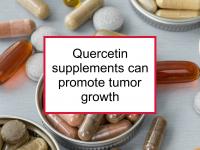Quercetin, which is a phytoestrogen, has been found both to inhibit and promote breast cancer cell growth. Phytoestrogens are structurally similar to the estrogen 17β-estradiol (E2). Despite great interest in the topic and numerous studies, the net effect of phytoestrogen exposure on the breast remains unclear.
Latest research finds quercetin promotes brain tumor growth
The study referenced at the beginning of this news article was designed to investigate the effect of quercetin supplementation on glioma growth. Gliomas are tumors arising from the supportive tissue of the brain. The authors previously demonstrated that quercetin reduced the growth of glioma cells. In the present study, the authors sought to determine whether quercetin could affect tumor growth in a rat model of glioma.
Daily injections of (50 mg/kg) quercetin into the body cavities of the rats led to increased concentrations of quercetin in rat brain tissue. This was associated with a time-dependent increase in brain tumor volume. In other words, tumor growth increased as quercetin accumulated in the brain. This was accompanied by a small reduction in a marker of favorable glioma prognosis (lower lymphocytic infiltration) and by a small reduction in cell viability of peripheral T-cells (which are an important element of the immune system). The quercetin treatment also did not improve body weight or liver pathology markers compared to untreated control rats. The authors conclude that although a significant number of cell studies point to anti-cancer properties of quercetin, the results of the current study demonstrate that the design of clinical trials involving quercetin and use of quercetin as a dietary supplement should be undertaken with great caution.
